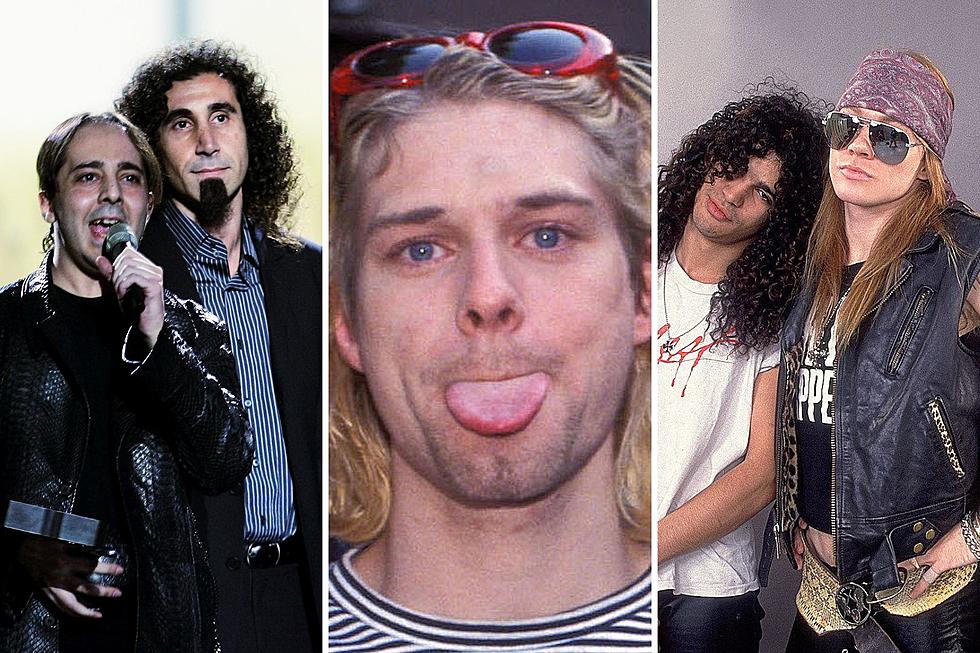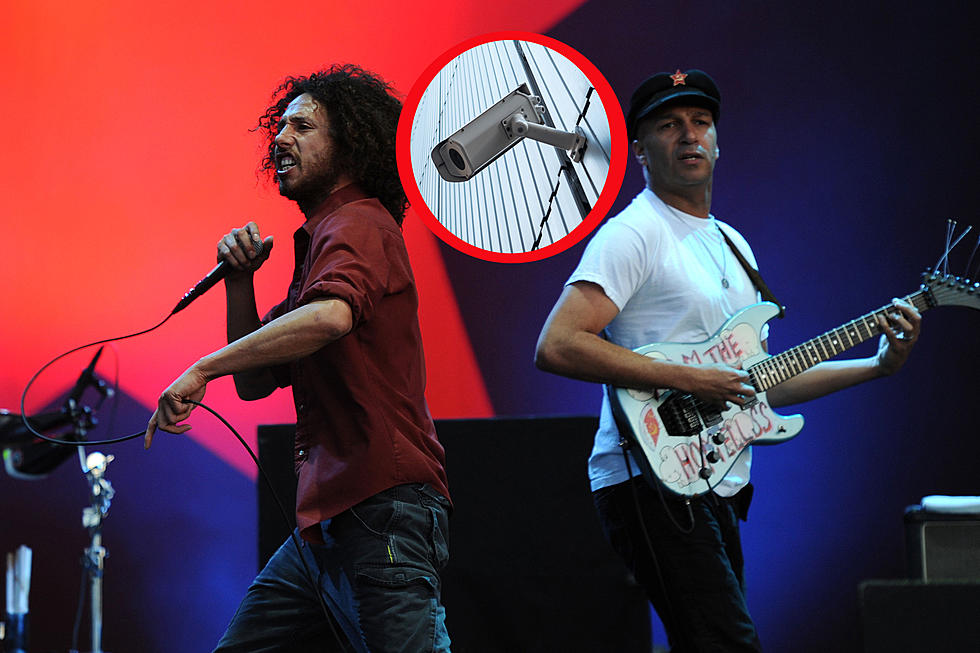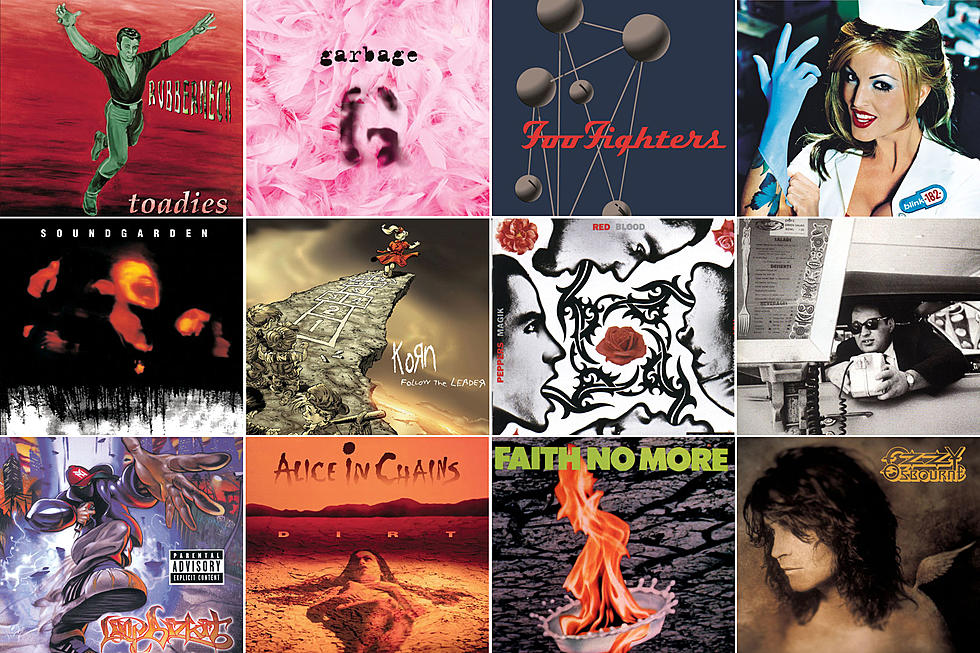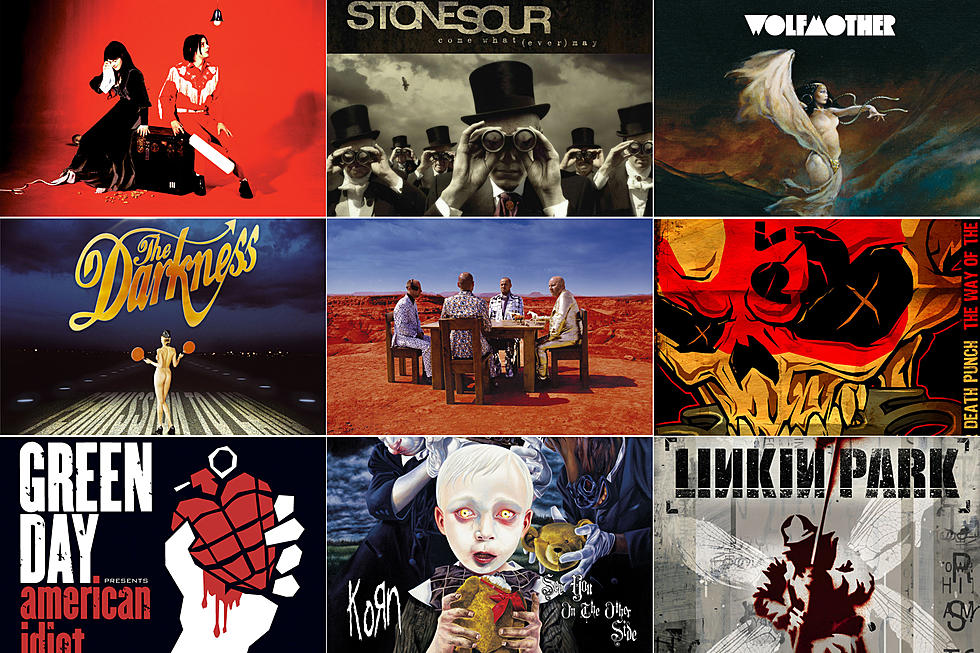How Rage Against The Machine Inspired Pop Evil, Explained
Pop Evil are currently on the road with Poison and Cheap Trick. There's a big age difference between them and their tourmates, but the pairing makes sense. Like the legends they're opening for, Pop Evil play catchy songs with huge guitars. And like those bands in the '70s and '80s, rock radio loves Pop Evil.
Their new self-titled album sees them still cranking out hits: "Waking Lions" is one of this year's biggest rock songs. But they're also stretching out, as on "Colors Bleed," a song that was inspired by Rage Against the Machine, a band who had a huge impact on frontman Leigh Kakaty. That song was the jumpoff point for our conversation with Kakaty and guitarist Nick Fuelling.
Tell me about the song “Colors Bleed.” It's a bit more political than what we're used to hearing from you.
Leigh: Nick was just playing so dirty, in a way that I’ve never heard him play. He gave me this energy that was very similar to my favorite band growing up, Rage Against the Machine. I grew up in Michigan rapping and singing, so it was like: this might be my moment to finally channel that inner Rage album I always wanted, and at the same time not be afraid to tap into issues that are going on in the world today that frustrate me.
Being a minority in this rock genre, these are issues that I deal with [but] that I shied away from on previous albums. It’s not like I’m trying to shift anyone to the left or right on this issue. It’s just that I want people to be aware that we all have a problem with things sometimes that we see on TV or read in the news, but it’s safer to have that problem on our couches, rather than try to do something about it. Not that we can all make a difference directly in that moment, but just being aware and knowing that we want change, I think, is a start. So if we can make a positive impact through these songs on this album with people, I think that’s an important thing. And “Colors Bleed” is definitely one of those songs.
This isn’t a political record; it’s more of a social record to just let our fans know that we are aware, and we’re not trying to write fluff. I mean, it’s a rock band. That’s the beautiful thing about this genre, is that we write about real things. You think about Woodstock and all the things that were going on in Vietnam and the songs that were written during that time, those are timeless songs for a reason because those artists weren’t afraid to just write about what they were going through in those moments. Look, it’s a scary time as fathers, as mothers, as brothers and sisters.
A lot of fans don't want to hear any kind of political messages in music; do you worry about upsetting your fans?
Nick: Social media an incredible tool for uniting people, but it’s also dividing people as well. It’s pitting people against each other more than they ever have been, and it’s getting worse and worse.
We don’t live in some musical bubble where nothing affects us. We’ve gotta make sure we get our emotions out as well. It’s frustrating to see, and there’s gotta be something that we can do as people to help move forward.
Talk about how Rage Against the Machine influenced you.
Leigh: Zack [de la Rocha] was the guy that motivated me to be where I’m at. When I was listening to rock... I was always kind of afraid to be a singer, because I didn’t look like other rock singers, so I didn’t know if I would be accepted, right? It seems funny now, but when you’re just a little kid growing up in western Michigan... me being here, doing this interview in New York City was a pipe dream, man. No one was gonna be interested in what I had to say. So there was a lot of insecurity there growing up. So I think that with Rage and being able to be comfortable in your skin really motivated me to chase the dream. I was like, "Wow," when I first heard that record, it put me in a place. However, at the same time, when I listen to a record, when I listen to a Rage record, I was always motivated and pumped and angry. I couldn’t take 10 or 15 songs of that. I had to have some kind of melody.
I didn’t grow up miserable. My mom and dad were wonderful people. They were hard workers. They did everything they could so my brother and I could have a better life. They came to this country with a dream. So I could relate to a lot of things, but I still, from a melodic standpoint, I couldn’t. I always could sing, and I always loved those catchy AC/DC songs... they just brought people together.
I always was so mesmerized by those songs that can make grandmothers sing. Like you’ll be at a wedding and grandma’s up there “Da-da-da-da-RE!! Da-da-da-da SPECT!” Grandma’s dancing to Pantera. She’d never buy a Pantera record, right? But there she is, she knows every word. That moved me: what gets people of all walks of life, all genders, colors, aliens, illegal or not, what brings them together in one venue to put the horns up, proud of who they are. And Rage was a big part of that. Pearl Jam as well, on the other side. And growing up in Michigan: that was the fuel. That yin and yang triggered Pop Evil, [that's] why there was no other name for the band. If you think about what the name means, there’s pop evil--whatever popular culture, popular music was, I didn’t fit into that norm. I was always “evil” to that kind of mainstream mentality.
So Pop Evil was not just a band name, it was a mission statement. I would get up, and it was almost like the fuel that made me fight that whole concept that rock and roll was dead. I needed to get up there and be like a crusader for rock, to let other kids that were of mixed descent like me say, "Look, I look like that guy. I can do rock too, and I can be me, and I can express myself with melody." And I always hoped the good Lord would pave that way for me to motivate other people in a positive way. So those were the early signs for me.
The rock audience has changed in recent years. It seems a bit more diverse.
Leigh: It’s just like how white people wanna listen to hip-hop or Latin music. Other cultures are affected by American culture and rock music. We see it every day because we play so many venues, and you see so many different people coming to the shows.
You think it’s middle-aged white men that are out there just Judas Priest-ing it up, but it’s not. And having toured with Judas Priest, we can literally tell you it’s not. So it’s a different climate, especially today when people wanna rock and they put their horns up, they wanna listen to good old-fashioned rock ’n’ roll. And there’s no one rule or one way to do it. So you’re exactly right.
Seeing somebody who looks like you makes you believe you can do it, whether it's in a rock band, or in movies, or anything else.
Leigh: That’s a hundred percent, exactly right. I knew I could sing, I knew I could rap at a young age. But I didn’t look like Tupac, I didn’t look like Robert Plant, pretty plain and simple. And it sounds obvious to the people who may be watching or listening, but when it’s you, and you look like that, there’s a big fear. You’re like, "They’re not gonna accept me, and I guess I’ll just have to sit over here." And I think a lot of people feel that.
This is what America has bragged about for centuries. This is the melting pot, right? This is where you can come and fulfill your dreams. So our generations before us had bought into that fantasy and all moved here. They’ve come from many, many miles away and different countries and different ethnicities to be here for that dream. And now you’re seeing it with their kids and their offspring, people like me, people like you saw in the movies [that star people of color], people that are the directors to finally cast those roles, to really give America what we’ve been talking about for centuries. It’s finally starting to happen. This climate, it demands it.
It doesn’t matter who you are. If you can bring it... I mean, look at our drummer. We have a female drummer [Hayley Cramer] who hits harder than any guy I’ve ever seen. She slays, and her passion for the craft has changed our game, and it’s demanded us to be better. Years ago we would’ve never thought we’d have a woman in our band, just because it was such a boy's club. Now, there’s tons of girls on the bus, whether it’s in our crew or in our camp and tour managing or whatever it is--if you’re capable of doing it, you can be an alien from Mars; you come down here, and America’s the place for you to be. That’s the American dream, man, that we don’t judge. It is the land of the free, home of the brave, right? And it’s only gonna get better for everyone in the long run, but we just have to accept it now.
You guys are playing Rocklahoma. I was looking at the lineups of the rock festivals over the years, and you guys moved up from playing early in the day on the small stages, to later in the day on the small stages, and now to the big stages. Talk about how that circuit of festivals has helped your career.
Nick: Yeah, I think it definitely has helped us. Anytime you can get in front of a mass amount of people at one time, it’s every band’s dream. These festivals that have been popping up more recently have been nothing but great for the rock environment in general. The more you play those festivals, you start seeing more and more people singing along to the songs and dancing along to the music a little bit differently. I think it kinda shapes how we write music as well, seeing what things people are reacting to live, and we try and take that energy into the studio as well. So I think playing those festivals and growing with them definitely shaped our career.
You mentioned the "rock is dying" narrative in the music media; do you think these festivals prove that it’s alive, and the media just isn’t paying attention?
Leigh: That’s exactly what it is. I’ve thought about this my whole career.
Someone decided our voice matters a little bit less. Pretty ironic when you grew up in a country that prides itself on freedom of speech, but our voice matters less. Come on, dude. At least represent our genre [at the Grammys].
We learned how to play instruments. Now people use computers. That’s fine. But there’s still a blessing in learning how to play an instrument, picking one up. We started in a garage and did it the old school way. We didn’t just start on a computer keying it up. Old school, man: the roots. Our country, what it was built on, it was built on drums, bass, two guitars, and you learned how to play blues, jazz, country, hip-hop, rock and roll. You just express yourself. That’s what this country’s about, expression. Pick up an instrument and express yourself. That’s it. Sorry, I get passionate about this. I’ll talk your ear off.
Pop Evil's self-titled album is out now and can be picked up via Amazon and streamed via Spotify. Look for the band on tour with Poison and Cheap Trick at these stops.
See Pop Evil in 2018's Best Rock Albums... So Far
More From WRRV-WRRB










